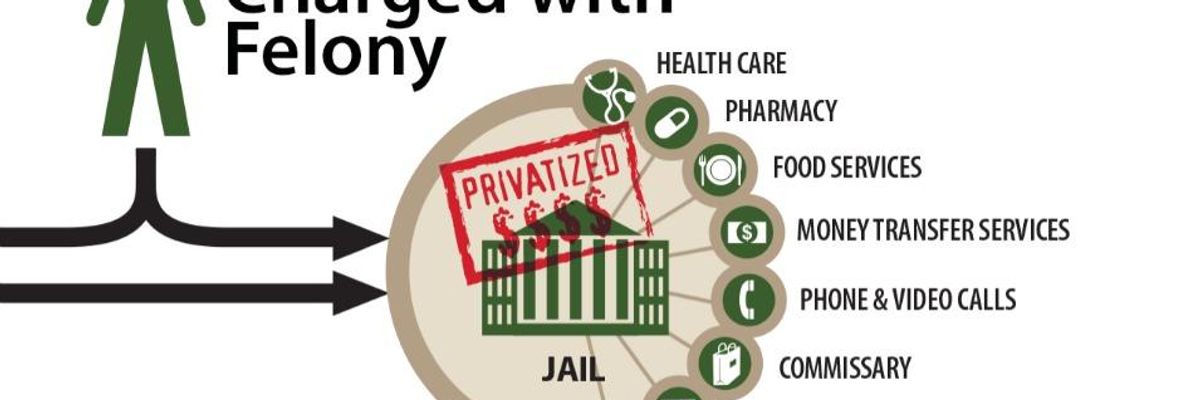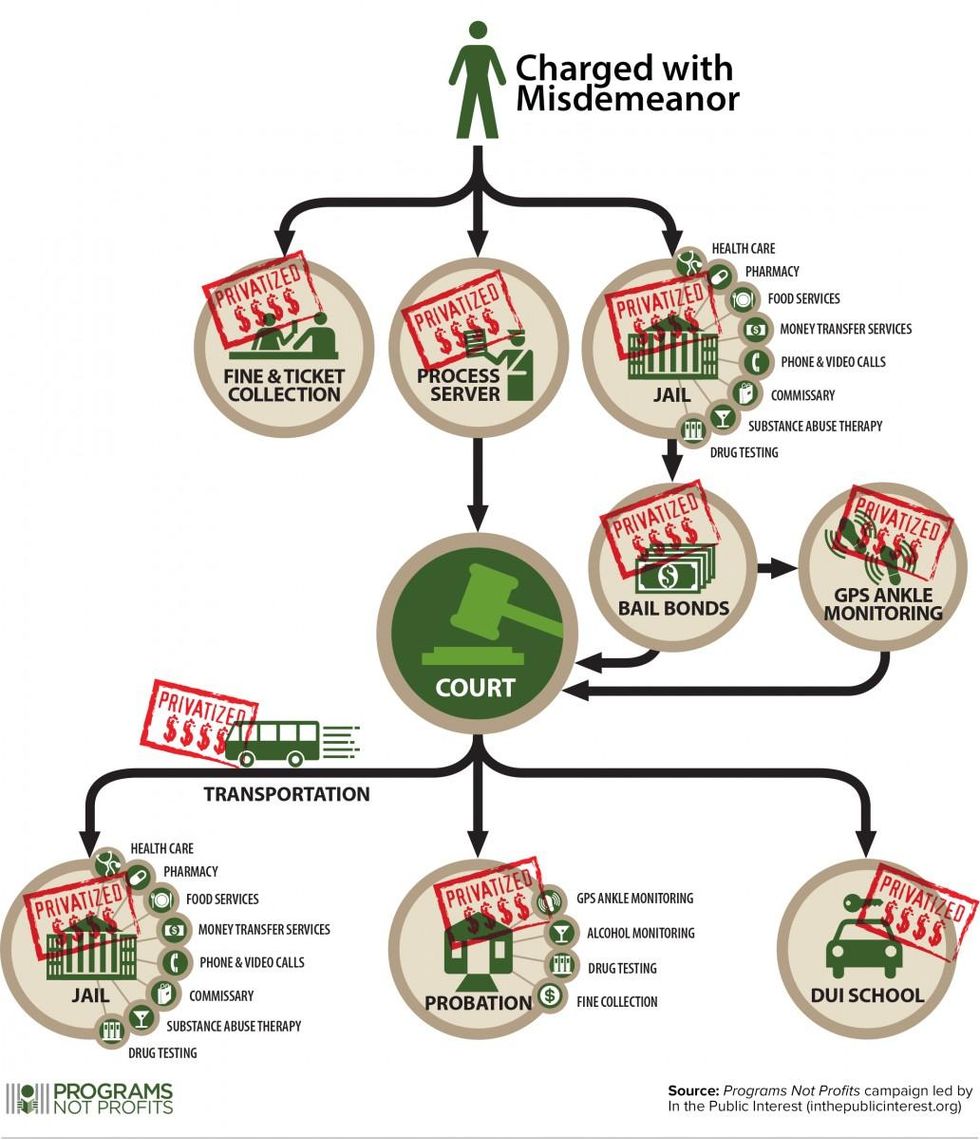

SUBSCRIBE TO OUR FREE NEWSLETTER
Daily news & progressive opinion—funded by the people, not the corporations—delivered straight to your inbox.
5
#000000
#FFFFFF
To donate by check, phone, or other method, see our More Ways to Give page.


Daily news & progressive opinion—funded by the people, not the corporations—delivered straight to your inbox.

More and more Americans--including leaders from both political parties--agree that our criminal justice system is broken. Even former House Speaker Newt Gingrich says we can no longer afford "business as usual." There's no debate: mass incarceration is neither cost-effective for taxpayers nor safe for our communities.
But the private corrections industry, made up of companies that make more profit when more people are in the system, could make real change harder.
A new look at the industry shows that private companies profit from nearly every function of America's criminal justice system. The industry's scope is startling: companies perform functions like prison operation and immigrant detention, but even GPS ankle monitoring and residential reentry.

While the usual suspects--Corrections Corporation of America (CCA) and GEO Group--operate prisons, numerous companies with similar track records provide services like health care, food provision, and prisoner transport. Companies like Corizon, Aramark, JPay, and GTL have histories of providing low-quality services, harming not only prisoners, but communities and taxpayers as well.
We already know that the industry routinely cuts corners to make more profit, resulting in prison violence, lawsuits, accidental releases, and high staff turnover. But now it's clear how much of the system is influenced by private companies, which are driven by profit to keep or even expand existing services.
The look is part of a new campaign to replace private profits with publicly funded and managed programs aimed at the change we all want to see. Programs Not Profits calls for reinvesting the hundreds of millions of dollars that go to private corrections profits each year into job training, mental health care, and substance abuse treatment.
We need a system that addresses the root causes of crime rather than one that locks away the symptoms and hopes they never get loose.
Every dollar in profit for the private corrections industry is a dollar that could be invested in building a more moral and cost-effective criminal justice system, a system that doesn't harm prisoners and better serves communities, taxpayers, and working families.
See other infographics from the campaign here.
Trump and Musk are on an unconstitutional rampage, aiming for virtually every corner of the federal government. These two right-wing billionaires are targeting nurses, scientists, teachers, daycare providers, judges, veterans, air traffic controllers, and nuclear safety inspectors. No one is safe. The food stamps program, Social Security, Medicare, and Medicaid are next. It’s an unprecedented disaster and a five-alarm fire, but there will be a reckoning. The people did not vote for this. The American people do not want this dystopian hellscape that hides behind claims of “efficiency.” Still, in reality, it is all a giveaway to corporate interests and the libertarian dreams of far-right oligarchs like Musk. Common Dreams is playing a vital role by reporting day and night on this orgy of corruption and greed, as well as what everyday people can do to organize and fight back. As a people-powered nonprofit news outlet, we cover issues the corporate media never will, but we can only continue with our readers’ support. |
More and more Americans--including leaders from both political parties--agree that our criminal justice system is broken. Even former House Speaker Newt Gingrich says we can no longer afford "business as usual." There's no debate: mass incarceration is neither cost-effective for taxpayers nor safe for our communities.
But the private corrections industry, made up of companies that make more profit when more people are in the system, could make real change harder.
A new look at the industry shows that private companies profit from nearly every function of America's criminal justice system. The industry's scope is startling: companies perform functions like prison operation and immigrant detention, but even GPS ankle monitoring and residential reentry.

While the usual suspects--Corrections Corporation of America (CCA) and GEO Group--operate prisons, numerous companies with similar track records provide services like health care, food provision, and prisoner transport. Companies like Corizon, Aramark, JPay, and GTL have histories of providing low-quality services, harming not only prisoners, but communities and taxpayers as well.
We already know that the industry routinely cuts corners to make more profit, resulting in prison violence, lawsuits, accidental releases, and high staff turnover. But now it's clear how much of the system is influenced by private companies, which are driven by profit to keep or even expand existing services.
The look is part of a new campaign to replace private profits with publicly funded and managed programs aimed at the change we all want to see. Programs Not Profits calls for reinvesting the hundreds of millions of dollars that go to private corrections profits each year into job training, mental health care, and substance abuse treatment.
We need a system that addresses the root causes of crime rather than one that locks away the symptoms and hopes they never get loose.
Every dollar in profit for the private corrections industry is a dollar that could be invested in building a more moral and cost-effective criminal justice system, a system that doesn't harm prisoners and better serves communities, taxpayers, and working families.
See other infographics from the campaign here.
More and more Americans--including leaders from both political parties--agree that our criminal justice system is broken. Even former House Speaker Newt Gingrich says we can no longer afford "business as usual." There's no debate: mass incarceration is neither cost-effective for taxpayers nor safe for our communities.
But the private corrections industry, made up of companies that make more profit when more people are in the system, could make real change harder.
A new look at the industry shows that private companies profit from nearly every function of America's criminal justice system. The industry's scope is startling: companies perform functions like prison operation and immigrant detention, but even GPS ankle monitoring and residential reentry.

While the usual suspects--Corrections Corporation of America (CCA) and GEO Group--operate prisons, numerous companies with similar track records provide services like health care, food provision, and prisoner transport. Companies like Corizon, Aramark, JPay, and GTL have histories of providing low-quality services, harming not only prisoners, but communities and taxpayers as well.
We already know that the industry routinely cuts corners to make more profit, resulting in prison violence, lawsuits, accidental releases, and high staff turnover. But now it's clear how much of the system is influenced by private companies, which are driven by profit to keep or even expand existing services.
The look is part of a new campaign to replace private profits with publicly funded and managed programs aimed at the change we all want to see. Programs Not Profits calls for reinvesting the hundreds of millions of dollars that go to private corrections profits each year into job training, mental health care, and substance abuse treatment.
We need a system that addresses the root causes of crime rather than one that locks away the symptoms and hopes they never get loose.
Every dollar in profit for the private corrections industry is a dollar that could be invested in building a more moral and cost-effective criminal justice system, a system that doesn't harm prisoners and better serves communities, taxpayers, and working families.
See other infographics from the campaign here.